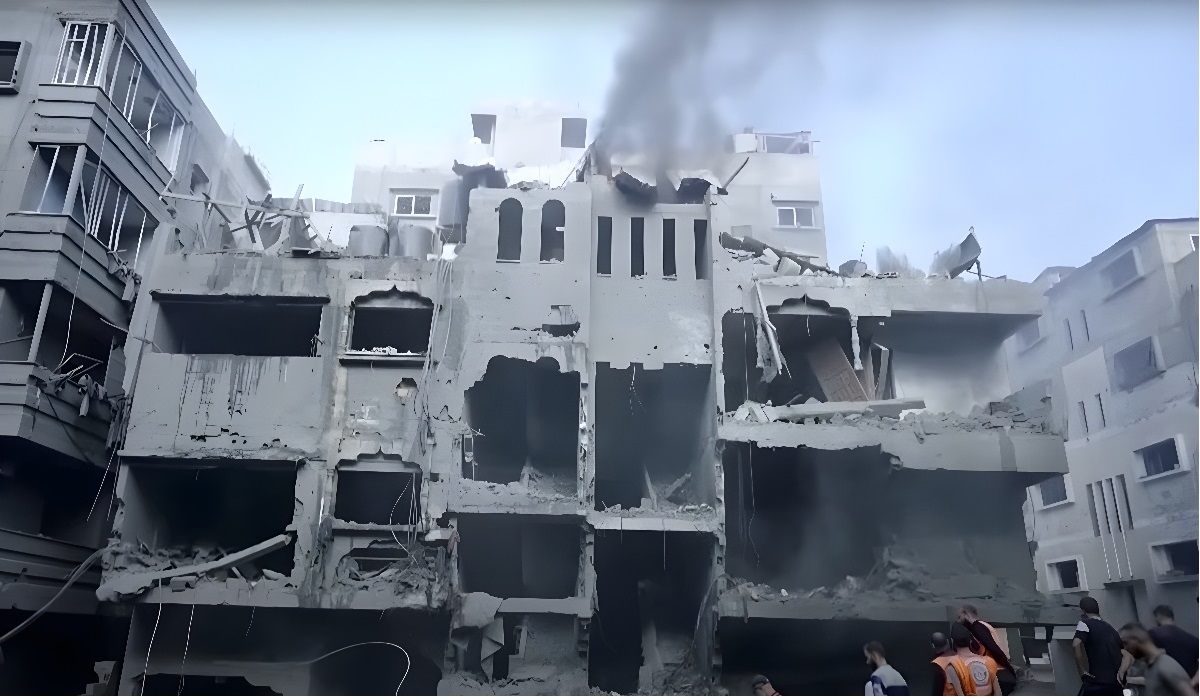Al-Mawasi Strikes Expose Failures of So-Called ‘Humanitarian Zones’ in Gaza
- Naomi Dela Cruz
- Middle East
- Trending
- September 10, 2024

Image Credit, NRC
Israel’s continued airstrikes in Gaza’s densely populated areas, including the recent assault on Al-Mawasi, have underscored the inadequacy of its so-called “humanitarian zones,” where civilians have been directed to seek refuge. The Norwegian Refugee Council (NRC) has condemned the latest attacks, which occurred in an area designated by Israel as a safe zone for Palestinians fleeing the ongoing conflict. Despite this designation, these zones have offered little to no protection, with the latest strikes leaving behind massive craters and the deaths of civilians who had been told they were fleeing to safety.
The attack on Al-Mawasi, an area now reduced to just 13 percent of Gaza’s territory, saw over 30,000 people per square kilometer crowded into makeshift shelters. According to Jan Egeland, Secretary General of the NRC, images from the aftermath of the attack are harrowing, with families—many with children—having been buried under tents as the strikes obliterated the area.
“For nearly a year, Israel has forced Palestinians to move from one location to another under the pretext of providing safety, but the reality is that no place in Gaza is safe. Only a ceasefire can prevent further bloodshed,” Egeland said in a statement.
The attack in Al-Mawasi has heightened concerns about the Israeli government’s tactics and the lack of genuine humanitarian protection for Palestinians. Since the beginning of the escalation, Israel has issued multiple relocation directives, forcing people to move without providing proper accommodations or safety guarantees. In August alone, over 260,000 Palestinians were displaced by 16 relocation directives, many of them already displaced multiple times prior to that.
Amidst the chaos, aid operations in Gaza have also been crippled by severe restrictions imposed by Israel. NRC teams, who had been assisting displaced Palestinians in Deir al-Balah, were forced to relocate to Al-Mawasi due to Israeli directives. They eventually returned after days of disruption, following a rare reversal of Israel’s orders. However, as Egeland pointed out, these constant displacements have severely hampered their ability to serve the local population.
“How can my colleagues continue supporting these populations when they themselves are being displaced repeatedly?” Egeland questioned. “The time and resources we should be devoting to relief efforts are instead being spent on constant contingencies.”
The humanitarian situation in Gaza continues to deteriorate. NRC assessments of 62 sites hosting over 129,000 internally displaced people (IDPs) in Deir al-Balah and Khan Younis revealed dire conditions. At many of these sites, families are crammed into tents shared by 10 to 15 people. Fifty percent of these locations reported receiving no food support, while 85 percent had no access to latrines or solid waste management, increasing the risk of disease.
The situation is further exacerbated by a sharp decline in aid entering Gaza. In August, an average of just 69 aid trucks entered Gaza daily, the lowest number since October 2023. Egeland emphasized the impossibility of sustaining human life under these conditions, calling on Israel to prioritize the protection of civilians and humanitarian workers and facilitate the delivery of aid. He also underscored that a cessation of hostilities is the only viable solution to prevent further catastrophe.
“The forcible transfer of Palestinian civilians is a violation of international law, specifically the Fourth Geneva Convention,” the NRC said in a statement. “Relocation areas have not provided the safety or essential services necessary for survival, and there is no assurance that displaced populations will be able to return to their homes once the fighting ends.”
With Gaza’s humanitarian zones offering little more than a false sense of security, the international community faces increasing pressure to address Israel’s actions and push for an immediate ceasefire. For the Palestinians, survival has become a daily challenge, with no end to the violence in sight.








